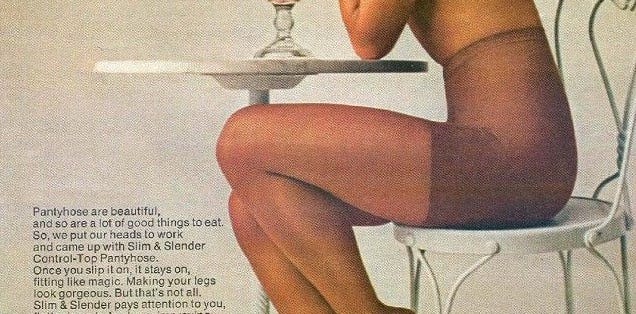
“I used to counsel young women never to do two things, or not to do them in conjunction: 1. learn to type; 2. buy pantyhose.”
Could we talk to you about pantyhose? Or rather — could our editorial director, Susann Cokal, talk about them? Below, you’ll find the link to an essay about their storied past, their relationship to typewriters, and just how thoroughly they shaped a young woman’s work life in the 1980s … and how one plucky gal struggled against them.
Misconduct in a sexually charged workplace is finally getting the attention it needs, late in 2017. It has affected almost everyone. And here’s how the norms got instilled in one young woman’s expectations.Cokal bares some NASTY SECRETS about the hose, the clothes, the bosses, and just how pervasive sexual harassment was and is. And it didn’t just come from men …
Read the essay here or on WebdelSol.
***************************************************

My Life in Pantyhose
Susann Cokal
I used to counsel young women never to do two things, or not to do them in conjunction: 1. learn to type; 2. buy pantyhose.
From time to time it was necessary to do one or the other, but the combination meant you were practically assured a future as a secretary, which was fine if that was what you wanted to do.
But being secretarial in the 1980s, when I started my work life, meant having to appear constantly cheerful (which I was not) and receptive to lewd comments by unsavory older men (which I was not) and forced to accept makeovers from one’s female bosses, which usually meant wearing their cast-off foot-warping heels and pussy-bow blouses and even makeup in colors they had rejected, in general feeling as full of self-esteem as on the days in junior high when the cheerleaders took one aside and launched into a long list of impossible beauty tips.
The decade was supposed to be a transitional time, one in which women were getting more power and older gender roles were on the wane, but pantyhose were part of a gal’s power outfit, and pantyhose were oppressive, uncomfortable, expensive, and awkward. And forget about sisterhood — women used pantyhose to control each other, perhaps even more than men did. We were all conforming to some vague idea of masculine preference that might (might!) let us hold on to femininity while we entered the world of men’s offices.

In the 1980s, if you worked with a typewriter you also had to wear the hose, which back then cost $2.50 a pair on a good day and typically lasted no more than forty-eight hours, if that.
They inevitably snagged on something under one’s desk or in the files one was collating and stapling. Then they developed a “run” that exposed a thin strip of your pallid leg skin and meant you had to throw them away, possibly skip out on your lunch hour to buy a new pair — when $4.00 an hour was a dreamy kind of wage and still didn’t cover much. For me, living in California, alone or with roommates, in college or grad school, made saving up for rent and tuition and a few cans of Campbell’s soup (I was anorexic so I didn’t need much) — a task both Herculean and Sisyphean. How was a girl supposed to afford pantyhose on top of it all?
“Also, pantyhose are by nature awful. They’re uncomfortable and they send a signal I don’t want to put out.”
Also, pantyhose are by nature awful. They cling to the skin like sweat, and they create a warm, moist nursery for yeast, bacterial, and viral infections. They flatten and accentuate any leg hairs even the most conscientious shaver has growing, so they require constant vigilance and a ridiculous amount of maintenance for something doomed to evanesce like Brigadoon, leaving lumps of fine-knit plastic in a landfill. They cannot be recycled, and manufacturing them sends toxins into the air.
But my main objection is a selfish one: They’re uncomfortable and they send a signal I don’t want to put out.
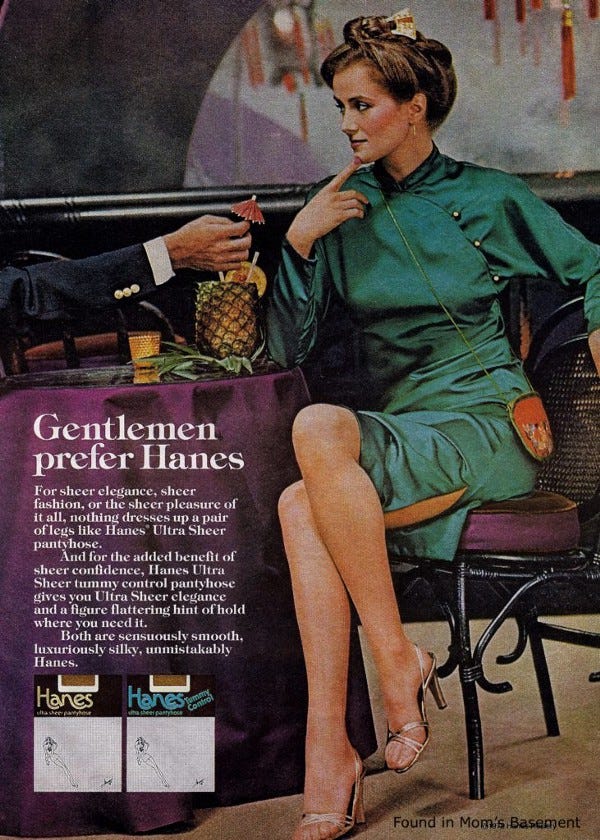
On the other side of the advice spectrum, an older woman told me during a performance review at a corporate job that I should “buy some business suits and wear them every day.” The reason being that I should “dress for the job you want to have and be sure you are seen professionally.”
I could respond only with a blank stare. When pantyhose cost a few dollars, a business suit cost around a hundred or two, and suits have to be dry cleaned, so the price per wear was always growing. I was just somebody’s assistant. I didn’t have money to buy a steak, let alone a suit other than the one I’d got on sale when I went in for the job interview.
That same woman reprimanded me shortly afterward, when she saw me wearing more durable, thick tights to work rather than pantyhose. “You’re slipping!” she said.
1. Nothing beats a great pair.
At first, admittedly, pantyhose entered my life with a silky sheen of glamor. They were advertised on television, in commercials featuring happy career girls gleefully opening a Humpty-Dumpty plastic half-egg to pull out a pair of L’eggs (get it) and montage-contemplating a carefree night on the town or a day behind a well-organized desk where their equally happy male coworkers — bosses — stopped by with stacks of paper and admiring glances for the legs in the pantyhose, and then the girls went on those dream dates with the bosses and married them. Fantastic!
The jingle was an earworm, even for a nine-year-old: Our L’eggs — fit your legs — they help you, they hold you — they NEVER LET YOU GO!
And this was a good thing. (Incidentally, L’eggs is one of the brands for which Peggy Olson and Joan Harris designed campaigns on Mad Men, which says a lot about where L’eggs stand in the canon of cultural references).
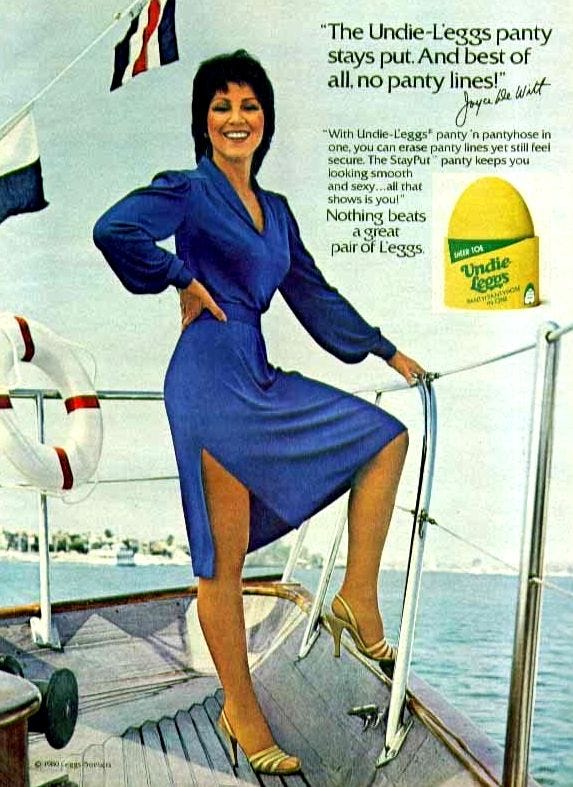
L’eggs came in several varieties. Skating star Peggy Fleming touted a line, Sheer Energy, saying it “massages, stimulates, and refreshes my legs” — and titillated TV watchers — because nothing beats a great pair of L’eggs.
Then there were Undie-L’eggs, which featured a tap-dancing Joyce DeWitt from Three’s Company, expressing her relief at finding “real” panties and hose in one so that she avoided panty lines, apparently a major plague on the woman of the 1970s. Control-top varieties firmed up (sort of) a pesky little belly, and some pairs came with extra-fragile sheer toes that could be worn with sandals. Of course they all conformed so effortlessly to the leg that no one could ever compare the wearer’s ankles to an elephant’s, as happened to one unlucky TV mom who wore inferior pantyhose when she took her TV daughter to the zoo.
Pantyhose. To the zoo. Think about it.
I remember an even more alluring commercial, this one for for the drably named Hanes brand. In the ad a glamorous woman sits in a train, probably speeding through Europe, definitely wearing a hat. Who is she? What is her career? No doubt something glamorous, probably a spy. And while the viewer figures that out, an equally glamorous man sits down across from her and openly appraises her legs, and a nasal soprano voice populates the soundtrack: Gentlemen … prefer HANES.
So that was a gentleman? So we learned. Forget about the stimulating massages offered by the L’eggs line; we now wanted to please those gentlemen, the spies who might love us. If they preferred Hanes (obviously) they would prefer us, and we were so used to pleasing our parents and teachers (the bosses of an old-fashioned childhood) that we knew instinctively what our next life step would entail.
On the playgrounds of Southern California, my friends and I belted all the jingles in a never-ending run of musical theater. Hanes, we sang the shimmery bridge of promise, will make you smooth and silky, shapely — sexy! Just what every eleven-year-old wanted to be. Really.
That espionage ad was part of a series, especially catchy, some of which are posted on YouTube. Pantyhose prevailed again when a Suzie Wong–style spy stole secret plans, then eluded capture by reclining on a divan and crossing her legs: The cool official was no fool, but he forgot one basic rule: Gentlemen … prefer HANES. And in case we were inclined to blame the poor guy for a lapse in judgment: A man can overlook a lot when Ultra Sheer is in the plot — gentlemen (everybody now!) …
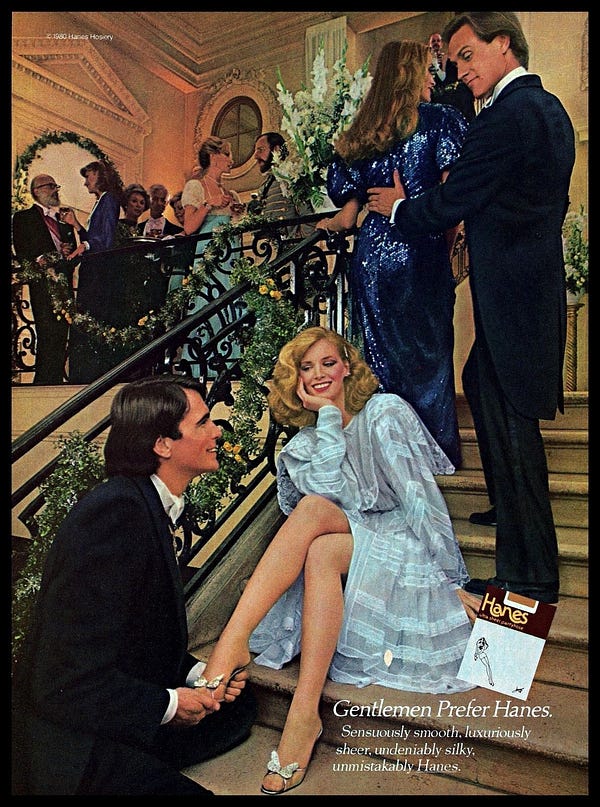
My “favorite” commercial features a young woman in a fluffy white dress dashing up a staircase: When rushing to that special ball, remember underneath it all …
A pair of stout elderly gents out of Alice in Wonderland or Kaiser Wilhelm’s doomed court variously twitch their mustaches and lose their monocles (incensing a female companion their own age) as their eyes travel up the pretty girl’s smooth and silky, shapely — sexy! gams.
Near the end, as the camera dwells on a perplexed leg that has somehow dropped its bow-toed pump and can’t do anything but pose, Problems seem to disappear when a handsome prince is near — and a young man holds up the shoe, because — yes — gentlemen … prefer HANES.
In the late seventies and early eighties, Cinderella’s slipper hardly mattered anymore; Cinderella’s stockings were all. The ads had done their jobs.
At my junior high and high schools, for example, after my family was transplanted to the mountains of New Mexico, pantyhose were de rigueur anytime a girl put on a skirt. It was customary to wear a pair in “tan,” never mind how poorly “tan” matched one’s actual skin color elsewhere. I heard the popular girls debating, and “tan” always came out on top; “taupe” was a distant second.
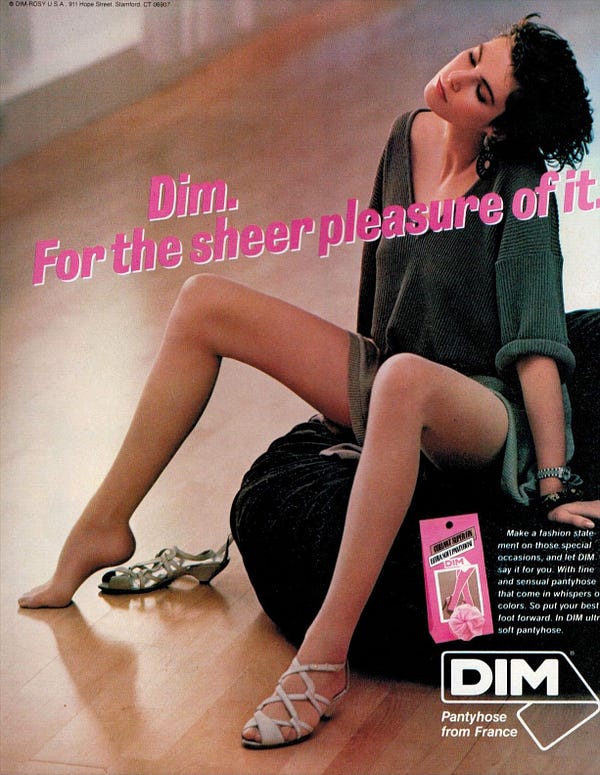
I was very pale, incapable of coaxing color to my skin no matter how long I “lay out” in the melanoma-inducing rays of high altitude. Getting my legs in a pair of pantyhose was especially important. My mother for some reason didn’t even allow me to wear a bra, which was beyond social suicide, especially since I was large-chested and tended to pop out of everything. However, she did let me have a pair of her old pantyhose with a run in them, and some silvery nail polish with which to treat the edges of the run. So I went to school in a skirt, yes, with breasts wobbling about, and nail polish highlighting the flaw in my pantyhose.
“ I had read an article in a major newspaper claiming that women felt naked without nylon on their legs; I was going to be a woman, so I had to feel the same way.”
Results were not pleasant. It would perhaps have been better to wear pachydermal socks at my ankles. But youth persisted in the face of parental laissez-faire: Grimly I wore the old pantyhose, and snagged more runs in them, and kept going. I had read an article in a major newspaper claiming that women felt naked without nylon on their legs; I was going to be a woman, so I had to feel the same way. I didn’t expect to be beautiful — I have enormous teeth, for one thing, and the cheerleaders had informed me my hair was too thin — but I wanted to be … appropriate.
Another thing I wanted, at least as much as I wanted a bra and pantyhose of my own, was to take a typing class. Almost everybody had to in those years; we weren’t born with keyboards fused to our wrists. I first taught myself when I was about ten, using a “Type Your Way Up!” manual at my elementary school; my first clocked speed was fifty words per minute. I took a class in high school and got up to ninety. I wanted to learn shorthand too, but my father wouldn’t let me — “You’re not going to be a secretary!” he shouted as if I’d done something nearly as bad as suggesting a career as a prostitute, which I did in fact suggest afterward, whereupon he told me seriously not to do it because those girls ended up with too many venereal diseases. Not just one venereal disease, too many.
A few years later, finally wearing a bra also cast off by my mother, whose chest was significantly smaller than mine and whose bras produced what’s now called a muffin top — but more importantly, without pantyhose — I walked past a group of high school mean girls and heard them stage-whisper, “GROSS.” And a shocked “She’s not wearing any hose!”
It’s true. I wasn’t. I’d given up that fight. And I didn’t have to wear any at my first job, which was at Baskin-Robbins, scooping ice cream in a polyester shirt and long pants. It paid $2.50 an hour, well below minimum, but there was a loophole in New Mexico law that said a franchise owner could pay his retail employees as little as he wanted as long as everything he sold was made within state lines. Some of the youngest kids made $1.50.
I was at the top of Mr. Fitch’s pay scale — Mr. Fitch, who said the teenaged workers were eating him blind and who had fascinatingly awful black hairs growing in the skin along the top of his nose.
I’ll admit I was part of the problem, though I worked harder than most of the employees. Wildly bulimic at that point, I’d serve the customers, scrub the counters, eat a few spoonfuls, and retire to what we called the “little scoopers’ room” to get rid of it all. This usually happened during the thunderstorms that came around three every afternoon and kept the customers away. If I didn’t go out to dance in the rain, I was in the back room vomiting up Rocky Road. After a while, anytime I leaned forward (as if to scoop out a six-ounce dollop from a vaguely unsanitary, hoar-frosty tub), I started to throw up by reflex. I considered it a good thing. Ice cream is very easy to get rid of, which may be why I don’t like it now; I’ve tasted it too many times.
I was significantly underweight, though not in a made-for-TV way. I still had big breasts, which at that age were as embarrassing as they were theoretically attractive. It was hard to find clothes. I decided to embrace the idea of cast-off duds and did all my shopping at thrift stores, where I could buy beautiful vintage cocktail dresses with rhinestones and beads for four or five dollars each. I probably looked like a callgirl stuck in a time warp. I made some of my own clothes, too, on a sewing machine my mother had bought in 1972 and never used.
“I’d look at flyers for typists who offered their services at a dollar a page, and I thought how lovely it would be to make money; but even more than that, I wanted to be loved.”
.
When I left for college, I used an hour’s earnings to buy a brand-new pair of pantyhose and didn’t need them. It was California; I went barefoot.
I could now type over a hundred words a minute, though, and had a keen sense of grammar. I never figured out how to say no to typing out papers for friends and classmates, free of charge. I’d look at flyers for typists who offered their services at a dollar a page, and I thought how lovely it would be to make money; but even more than that, I wanted to be loved.
2. Elegance means more than clothes.
“Where are you going dressed like that?”
“She works in an office. She always gets to look nice when she goes to work.”
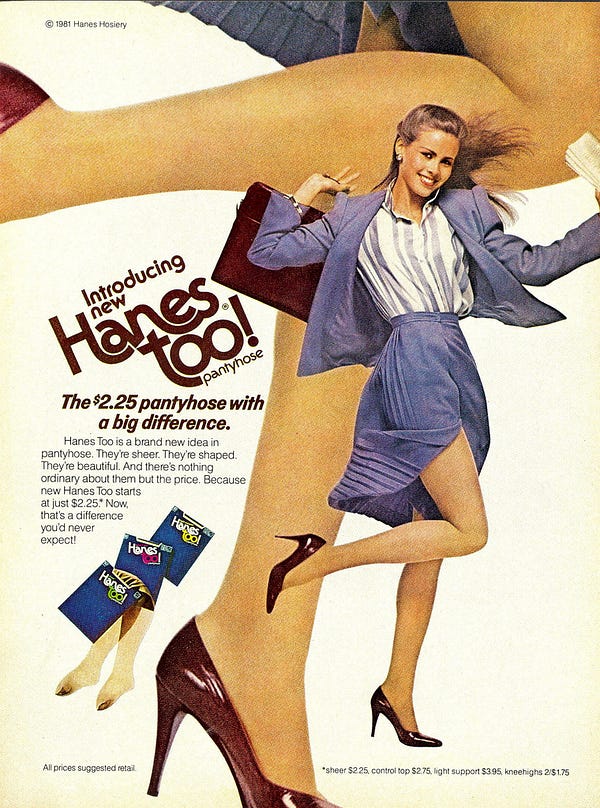
That was a couple of my roommates one summer, in a house near the uni, watching me take a single bite out of a piece of bread on which I was pacing myself. I put the bread away (one slice was good for two or three meals) and tugged up my pantyhose, which kept yitching out of position because they were sticking to the bottom of a ruffly green prairie skirt I’d made myself and didn’t have a proper petticoat for. I was in fact going to work. Without makeup, without anything that could be called an actual hairstyle, but with pantyhose. So I looked “nice.”
It was a summer job that paid a few cents above minimum wage: $4.50. That was the bare-bottom exacted by my parents if I was going to stay in California that summer instead of returning to New Mexico and Baskin-Robbins. I’d got the job while taking an overload of classes, and it seemed like a possible escape from exhaustion, or at least a change: receptionist at a “dynamic branch office of a diversified investment corporation.” The corporate equivalent of Sheer Energy pantyhose, which would stimulate and refresh not just my tired legs but my soul as well.
I had no idea what that description meant, and neither did the people who worked there. I’d been hired because the secretary, a former Miss Oregon USA who was sleeping with a vice president at the home office in Texas (somehow all this stuff sounds so wrong when it’s written down, but it was as glamorous as a “special ball” back then) and didn’t want to sit at the front desk anymore. Hiring a receptionist was her way of getting a promotion, although the promotion meant retiring to an office without windows where she read magazines and sent things to her mother using the business’s mailing accounts. She also took days off to think about her relationship with the man in Texas; the man in Texas himself would call me up himself long-distance and tell me that was what she was doing. Or I might get a phone call from her that began, “Go into my office,” and concluded with my driving out to her apartment with some cash, picking up her car after she’d abandoned it on an on-ramp, or bundling up some fabric with which I was going to make pillows for her sofa (I am also a near-pro-level seamstress; the prairie skirts were just a beginning).
All of this was okay, because there wasn’t actually any business at that business. It wasn’t diversified at all; the “executives” were supposed to cold-call people with money and invite them to invest in an oil well, but they didn’t really feel like doing that. All of the “executives” were men who spent most of the day pitching quarters at a wall and calculating wins and losses by how close they bounced to some arcane target. I’m pretty sure it was a variation on a drinking game I never played at college.
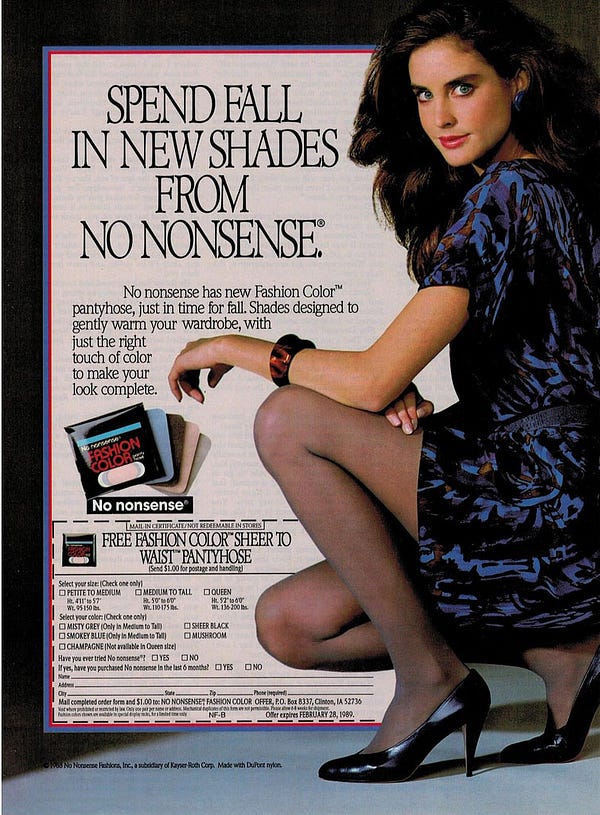
The “branch president” sometimes sat at his desk and had me bring him things to sign, mostly so he could declare proudly, “This is what we call — president business,” or “This is what we call — oil and gas business,” even though I could see the papers had nothing to do with the oil well. He was kind of simpleminded; he’d got the job because an investor (the only investor) felt some obligation to the man’s mother and had sunk a lot of money into the as-yet-imaginary well and insisted that “Donna’s boy” get the job. Eventually they hired his brother, too, who was a former hairdresser and very creepy.
The “branch president” wasn’t exactly creepy, but he did have an amazingly ill-fit toupee skating over a fringe of very dirty hair beneath, and it was hard not to stare. He liked to leave his office door open while he called up women who’d given him their real phone numbers on “office excursions” to the Del Mar racetrack — excursions in which I was not included because someone had to stay behind to answer phones and I wasn’t legal drinking age — and I’d listen to him telling these women he had made millions of dollars investing in businesses like El Torito, a chain of reasonably priced sit-down Mexican restaurants, and that his mother never had to worry about money because she had “Sonny Boy” to look after her.
“The ‘executives’ found my seriousness adorable.”
He’d say that one several times in a row, like an incantation: “Sonny Boy … Sonny Boy … I’m Sonny Boy!” He stared at me while he said it, presumably to gauge the effect he was having on the woman at the other end of the line.
It was all very amusing and pretty easy to ignore.
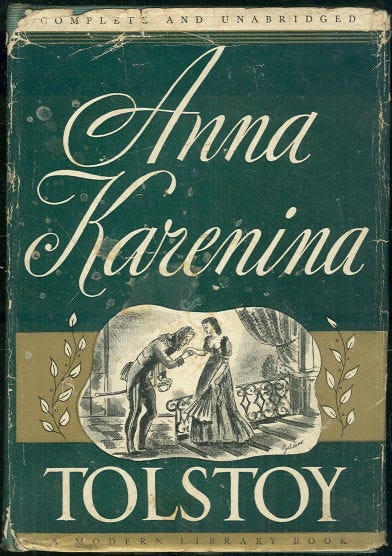
I was a serious student. I would depart that August to spend my junior year at the university in Poitiers, France, so I studied vocabulary lists and tried to read the French canon. For fun, I also read Anna Karenina and all of Thomas Hardy. I had a typewriter at my station, an IBM Selectric (now that name sounds porny) and I used it to type out my thoughts about the books and to work on some short stories and a novel I’d begun when I was seventeen. I’m pretty sure that the main character in that novel wore white pantyhose, because those had been fashionable when I’d started writing.
The “executives” found my seriousness adorable. One said I was wholesome and invited me out to see The Pope of Greenwich Village. It was semi-tempting. I had a boyfriend who was interning at a biotech company nearby and mostly wanted to watch MTV at night, when it still showed music videos.
The boyfriend was from a good middle-class family, which meant he liked pantyhose and prairie skirts. He thought I was too flabby, though, and pestered me to take jazz-dance classes, as if there were any way I could have eaten as little as I did and still managed to jump around in a leotard. When we went to the beach, he pulled on the strings of my bikini to make my boobs into marionettes that talked to each other.
“In the end I had a face that was not really a face, the way I feel when looking at plastic surgery now.”
A few weeks into my tenure at the diversified corporation, the secretary turned up, on time, with grocery bags full of things for me. Naturally these were not food items, as my self-starved body was doing okay as far as she could tell; she had brought me makeup and high heels and clothes she’d grown out of, having gained ten pounds since she took up with the Texan.
“We’re doing a maaaakeoooooover!” she exclaimed happily, a word hard for me to understand as she burbled it and, no doubt, just as hard to make sense of in writing. She pulled me into the bathroom, phones be damned, and started painting my face with heavy kohl eyeliner, brown shadow, sparkly blush, red lipstick. In the end I had a face that was not really a face, the way I feel when looking at plastic surgery now.
“Well, that’s better!” Miss Oregon said, and then she started tugging at my shoes. She said no self-respecting woman wore shoes less than three inches high, and the ones she was giving me were mostly what’s called mules, just a thin strap across the front and nothing to hold them on behind. The heels got stuck when I pressed down the gas pedal of my VW squareback, which was sometimes frightening on the highways, and I tripped so often I became the object of office witticisms: “Have a nice trip, Susie — see you next fall!” and the like.
Wearing those shoes, I was over six feet tall, and falling down that much was a bad idea. I wrecked countless pairs of pantyhose. Nobody offered me new ones; pantyhose were my responsibility.
A little while later, the “branch president” told me quite seriously, “I have seen a hundred-percent improvement in you since DeeDee began helping you out.”
The moment he judged me was the moment he became creepy too, but I had to say thanks; it was my job. It was also my job to let Miss Oregon send me to a beauty salon to get highlights put in my hair, and a real haircut. The streaks in my locks were freaky and made me cry, which made the crazy eyeliner run down my face, and I’m sure I sweated some more into the pantyhose (I feel as if I have to mention them here, as they are the governing metaphor of my work life).
Our L’eggs — fit your legs — they help you, they hold you …
Eventually I let them go. I made it to France, still with the makeup, and I wore pantyhose and some of those shoes in the hilly streets — for a short while. An American guy friend told me, “Man was not made to walk constantly downhill.” I said, “Man may not have been, but woman reputedly was.” It was received wisdom.
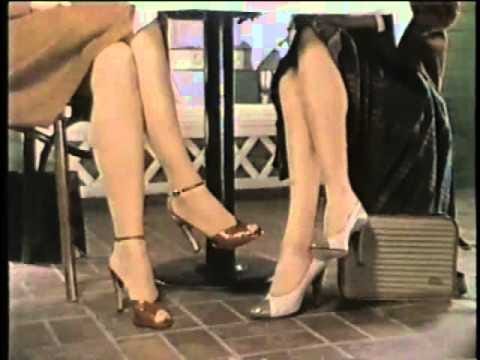
Nonetheless, I threw all those shoes away and wore my canvas sneakers everywhere. I also dyed my hair black, which went better with Miss Oregon’s makeup, and I enjoyed being asked, “Etes-vous japonaise?” … but only in Paris, for some reason; in Paris I seemed Japanese, in Poitiers just a hulking pale American proto-goth.
French department stores had beautiful sections just for pantyhose and old-fashioned thigh-high stockings, organized by deniers — the scale of the knit they offered, from very sheer to very thick. Sometimes I went to look at them; seeing a large quantity of almost anything lovingly displayed is a powerful experience.
3. Massages, stimulates, and refreshes old fetishes.
When I returned to America in 1985, a revolution had taken place. My surf-and-science Southern California college now had a cardboard shantytown in protest of Apartheid. C.d.’s were replacing vinyl records and even cassette tapes. And thigh-high stockings with visible garters were in vogue.
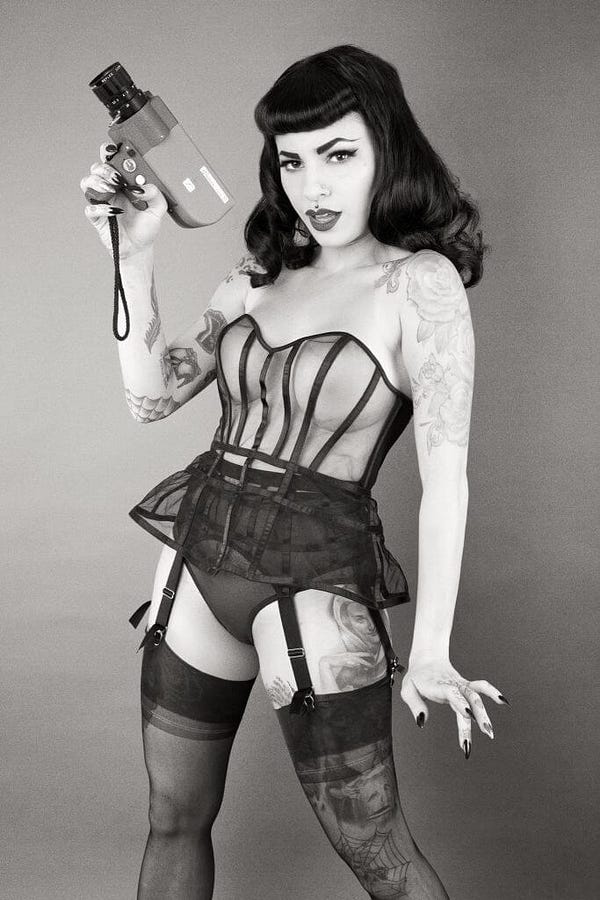
Strange as it sounds, one truth became indisputable: pantyhose were clearly an improvement over what had gone before. Try to imagine a thin, tight garter belt digging into your flesh and creeping downward or, god help us, garters attached to the bottom of an elastic or steel-boned girdle. They’re medieval torture devices. The top of a stocking fits into a flat metal loop on the “shapewear,” and then a rubber button slides up into a notch to hold the stockings in place.
Theoretically.
They are always popping out, which is why you need two or four or six of them per leg. And, as I knew from reading novels set in the 1940s and 1950s, a gal had to be sure the seams in back were straight or she’d ruin the impression she made from behind.
Stockings and garters and girdles had never entirely vanished, of course, though they’d been temporarily eclipsed in what was at the time an efficiency culture, which was how hosiery evolved in the first place. Presumably the first stockings — even Caesar’s army wore some kind of socks — were for warmth, not glamor. And the first iteration of pantyhose was made for showgirls around the 1920s, when costumers cleverly sewed long stockings to the girdles and bloomers of the gals kicking on stage or silver screen. The legs looked even-toned; the spotlight caressed them.
Showbiz or just biz or not, stockings might have become a casualty of World War II, as the silk from which they were made was diverted to the military; the army used the thread for parachutes. But the hose aesthetic endured. Some women tried dabbing their legs with foundation makeup to give the illusion … Oh, it was exhausting to think about the lengths to which they would go to look covered, smooth and silky.
Then when Dior introduced the postwar New Look — basically a return to corsets and hoop skirts — everyone got lavish with textiles, and stockings were definitely back, often in nylon. There was, however, some dissatisfaction with the way they had to be worn, and the technology of the Cold War was brought to bear on women’s legs. Scientists and designers noodled around with the idea of marketing practical “panties + hosiery” in the 1950s, often squabbling over who’d thought of some technique first. The idea didn’t catch on in the epoch of corset/girdles and fluffy skirts, but Spandex and nylon grew stronger and springier, clingier and shinier, every year. The times they were a-changing, and the hosiers were ready.
“In the 1960s, pantyhose provided double protection for an area subject to immodest exposure as a girl walked around, and avoided the bulges where a garter belt cut into the flesh and garters rippled.”
The miniskirts of the 1960s at last made pantyhose “a necessity” — if not for hippies, at least for girls at work and school and parties (and moms going to the zoo). Whether sheer-to-the-waist or reinforced to the crotch, pantyhose provided double protection for an area subject to immodest exposure as a girl walked around, and avoided the bulges where a garter belt cut into the flesh and garters rippled.
All young women were showgirls then. My father once told me that in the 1960s, when he gave chemistry lectures in amphitheater-style halls, he got a complete anatomy lesson.
Incidentally, tampons hit big at the same time and for some of the same reasons — wearing a bulky pad, especially one that had to be pinned to a separate elastic belt, simply wouldn’t work anymore. Tampons meant freedom — and so, in those days, did pantyhose. Comparatively. In 1970, sales of pantyhose surpassed regular stockings.
I think now that in a culture of increasing liberation, stockings had become some kind of transitional object, like a child’s blanket, reassuring the wearer that she belonged in her own skin and also in a larger society of hose-wearing females. Why else would twelve-year-old girls and seventy-year-old women alike feel such a strong need for them?
The old-fashioned kind of hosiery never left us; it went deeper, worming into fetish culture along with old Bettie Page pinups and The Rocky Horror Picture Show, which of course I’d seen and laughed at. What brought stockings and garters back into the mainstream circa 1985: Victoria’s Secret took over American malls, and MTV had been showing garters in videos such as ZZ Top’s “(She’s Got) Legs” and John Cougar Mellencamp’s “Hurts So Good,” in which the singer wears a codpiece and struts around with models in fishnets and garters.
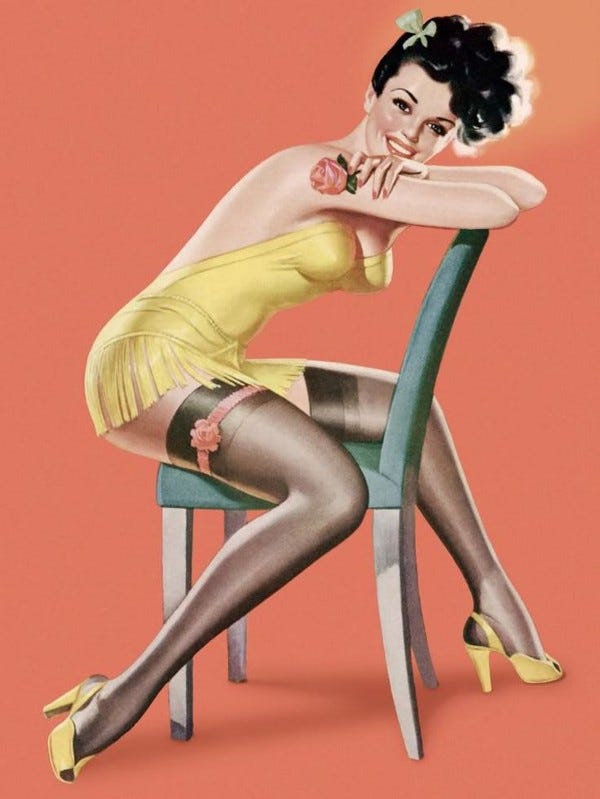
Suddenly everyone in San Diego was a fetishist. Everywhere I looked, garter belts and seamed stockings were striping the legs of giggling college girls. It hurt so good to be sexy, and this was what the gentlemen preferred now.
No codpieces, though.
So yes, I got some. I had to. I was a pioneer of the goth/vintage look after all, at least by happenstance. The old/new-fashioned legwear was uncomfortable, but I gritted my teeth and bore the wee points of pain, which were especially bad when I sat down on the little rubber buttons and metal clasps, until I got runs in all my stockings and with a sigh of relief went bare again.
4. A man can overlook a lot.
Springtime of my senior year, with a drawer full of laddered stockings (they were good for holding back my hair while I washed my face), saw my entrée into the publishing world — or so I thought it would. Entrée involved wearing pantyhose in the central library of my college, which was designed to look like a spaceship and has since been named after the real Doctor Seuss, Theodore Geisel. I went there to meet a published author, a psychologist with a book due out soon, who was in need of a personal assistant.
I wore one of my more cheerful thrift-store dresses, a green satin brocade with a paisley mixed in, and a pair of pantyhose, and some pointy green pumps my grandmother had given me, saying they had been my aunt’s. The psychologist was twice my age and trying to position himself at the forefront of the just-forming men’s movement. (He succeeded.) He was also breaking up with a woman with whom he’d been living for years, so after I got the job, he was prone to sudden dissolution into tears while I sat nonplussed, fingers poised over the keyboard of the Selectric in his at-home office, wondering what to do.
I had imagined this job would be glamorous. But I didn’t even have to dress up for it; in fact I wore my worst clothes and made myself intentionally frumpy. Much of the time I was driving out to the local coffee shop to get his Thermos filled, or to a copy store to run off Xeroxes that he would study intently for quality. He seemed to see things in the spray of toner that I didn’t, and photocopying one article to his satisfaction could take multiple trips to different copy shops.
He also saw a sea view from his office, which he’d built on the roof of the ranch-style house he was keeping in the breakup. The house was coincidentally just a few blocks from the one where my family had lived while I was in grade school.
“He sat on the toilet and dictated what he called ‘fantasy quotes’ to me, which I dutifully typed out on index cards just a foam-core door away.”
He was so proud of that view. To be supportive, I said I could see it too, a dark strip along the horizon. If I tried hard enough, I really did see it.
His first priority at that time was arranging celebrity endorsements to put on the jacket of his book-in-progress. He put a lot of thought into what those endorsements should be, and he did his best thinking on the toilet. During many of our hours together, he sat on the toilet and dictated what he called “fantasy quotes” to me, which I dutifully typed out on index cards just a foam-core door away.
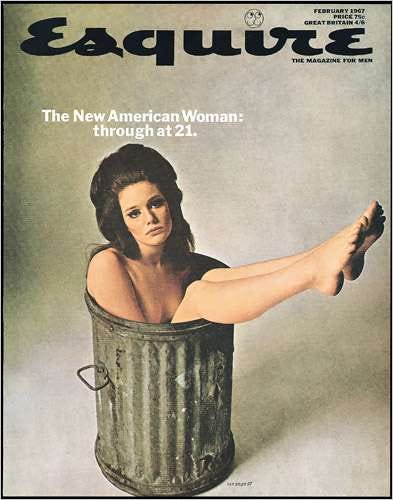
Sometimes, after a particularly loud eructation of the sort expected when a man is on the toilet, I was tempted to ask, “How do you want me to spell that?” But I didn’t — because I was working for a writer, and that was a glamorous and good thing in itself.
And then there was his movement. Pun.
After each brainstorming session, we pored over the fantasy-quote index cards together, and he figured out which celebrity he wanted to ask to pretend to have said which superlative line. One of the fantasy quotes compared him to Copernicus; I remember suggesting he might aim slightly lower and invite the celebrity to come up with his/her own comparison. He winked and dimpled at me. He thought of himself as warm and wonderful.
The other big thing I know about that employer is that he’d spent years writing a book manuscript about incest — why families do it and why it can be good for them. He told me about it in some detail, and he explained that despite some celebrity endorsements already procured, he’d decided not to publish because putting that message out would ruin his career. Other people know about the book now, but I’ve read interviews in which he says that those who describe it as I’ve just done have misunderstood him. All I know is what he told me.
There was another reason I let myself go frumpy, beyond the already uncomfortable confluence of toilet and typewriter … Like most straight men back then, and perhaps in part because of his work on the oppression of males, this guy was a bit of a letch. He once had me bent down and wiggling to get to some books and files as we reorganized his office, and he said, “Woo-hoo, Cokal, looking sexy, hot stuff!”
To which I replied instinctively — as I would have answered any guy who said such a thing to me, “Fuck you.”
I would never have predicted his next reaction: He burst into tears. I had, he told me, been hurtful.
Somehow I comforted him. Somehow I managed not to let that comfort involve sex. Honestly I don’t think he considered me sexy at all anyway; he’d probably been throwing me a bone with the offensive remark.

At the same time I worked for the man’s movement of one during the day, I had a pantyhose job at night. This time it was waitressing at Bob’s Big Boy, which also required the girls to wear lipstick. I was a spectacularly bad waitress; I forgot to bring people the bread that came with their meals. They complained about it a lot. They also complained when I did bring the bread, as it was a wizened little roll pulled out of the freezer and set under the heat lamp for a few hours.
The uniform at Big Boy was a brown polyester dress and black shoes and, yes, pantyhose. I was living rent-free with my sister at our grandfather’s old house, so theoretically I could afford to go to discount stores and buy “not first quality” pantyhose, inevitably destroyed each night. I was prone to nightmares and panics, and after going to bed at two I would sometimes wake up at four, convinced I had hot food waiting and knowing I was out of uniform, with cooks and customers angry at me. I would wake up all the way in front of the bathroom mirror, smearing on lipstick and fixing my hair and tugging on the treacherous hose and realizing that if I was there, I couldn’t possibly need to be at Big Boy.
Part of my confusion, maybe, came from sleeping on the sofa. My sister and her ferret had claimed the only bedroom and she didn’t have a job. Exposed as I was, I became the immediate target for the ferret whenever she opened her door. The ferret always seemed to want to bite someone or poop right by someone’s head, and my sister thought it was hilarious. If I couldn’t sleep after it woke me up, I read Barbara Pym novels and The Name of the Rose and hoped I’d find the courage to take my savings to Scotland or France and work as a waitress; Bob’s Big Boy was supposed to be training for that working-class fantasy.
One Sunday afternoon — the writer didn’t work on Sunday, and my Big Boy shift began at six — I went with a friend to the beach of my childhood. We were both in bikinis, of course. And of course there he was too. I want to say he was in a Speedo because that would be embarrassing for him, but he had on regular trunks. He came over to say hello. Later he asked me for my friend’s number. He was reasonably good-looking for a guy twice our age, so she was flattered but didn’t want me to pass the number along.
She did run into him at medical school that fall, though, when he was giving a lecture to raise awareness about ways in which white men such as doctors had been oppressed through being the world’s biggest wage earners. He said to her then, in front of her classmates, “I almost didn’t recognize you with your clothes on!” She was mortified but also paradoxically proud; he was a real monocle-dropper.
By the time that happened, I had moved up the coast to grad school. I just couldn’t take working the two jobs anymore, or the stench of my polyester Big Boy uniform at the end of a night, or the degradation of the “fantasy quotes” dictated from the toilet. Grad school seemed a more pleasant prospect.
Berkeley did not seem like a pantyhose town.
5. Heads will turn, you know it’s true; all eyes can’t help but notice you.
Because I’d decided to go to grad school so late in the summer, I’d missed the deadline for a TAship, and I needed a job. I wore pantyhose to my interview with another psychologist, a female professor who had grant money to spend on a personal assistant. She smirked at the reputation of my last employer. Her own research involved roomfuls of undergrads gathered together as test subjects, listening to her taped voice reading off a list of nouns like “bluejay.” Then they were supposed to make a chronological list of the nouns they’d heard. Unbeknownst to most of the group, there was one student, the “naysayer,” who was told to disagree with them all and put the words into a different order. The study was about the power of saying no.

I spent a lonely year in which I felt no deep in my bones. I did become friends with one of the department secretaries, the one assigned specifically to my employer, and she — the secretary — agreed with me about the pernicious results of learning to type.
She had a daughter she’d refused to allow to take typing classes. We went to Jazzercize together. She gave me some of her cast-off clothes, which were more normal than mine, but she didn’t offer them in an aggressive way; she just thought I might like them. She occasionally wore pantyhose but I didn’t have to.
Other secretaries in the department had stockings with seams, and they tugged at the garters from time to time as at badges of courage.
“Boring jobs with access to office equipment will keep our friendship strong.”
Midway through fall semester, the woman for whom I was working developed throat cancer and was forbidden to speak. Since she couldn’t talk, there wasn’t that much for me to do. I asked if she wanted to let me go and she wrote, “No,” very emphatically. She got all her shouting out in writing. I tried to ooze positive energy, even when she forgot to sign my time cards and I didn’t get paid.
One of the main things she wanted me to do was to buy her a new tape recorder with her grant money, even though she couldn’t use the tape recorder because the doctors had predicted a lifetime of silence if she ever used her voice now. I called every electronics store in town while she sat at her desk and listened to me and shouted in writing. It turned out that the kind of tape recorder she wanted wasn’t being made anymore, but she had a hard time accepting that. I provided her with lists of alternatives and typed up assessments of which store clerks and managers seemed most competent and helpful. She seemed to think this meant I was trying to sway her opinion unduly, and she shouted in a note, “I [underlined three times] CHOOSE THE VENDOR.”
I tried to explain I didn’t have any problem with that but was trying to give her all the information. She wrote me that one reason I’d got the job over many other applicants was that I hadn’t called myself a colleague, as one young man had done; I’d been aware all along that I was an assistant. She wrote that the best assistant she’d ever hired had been a housewife looking for something to do a few hours a week.
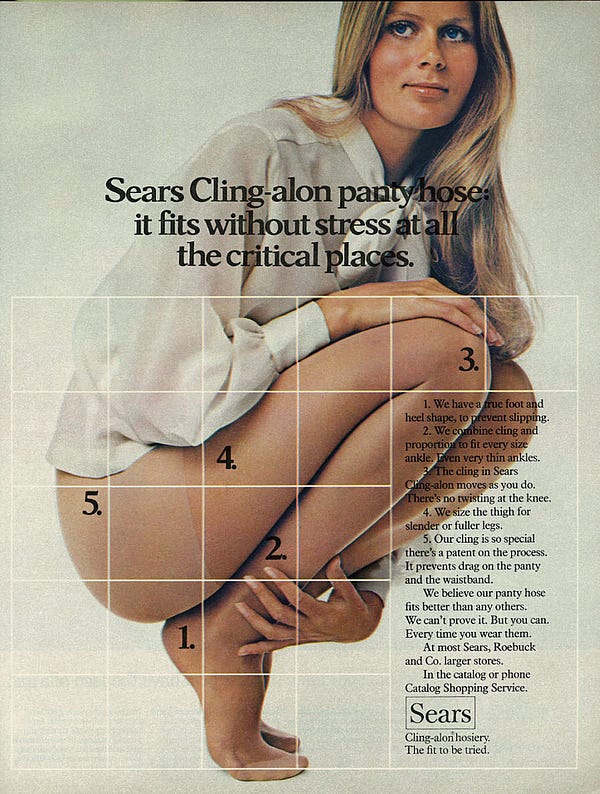
There were good aspects to the job too. I typed my papers on the typewriter in a tiny office upstairs. She really didn’t have enough work for me. I got another job taking lecture notes for a professor who spoke very fast and wanted his students to have all the material. I wrote long letters to my best friend from high school, who wrote back, “Boring jobs with access to office equipment will keep our friendship strong.”
They did. Thank god.
By the end of that dreadful year, I was ready to put the Ph.D. on hold for a while. I’d hooked up with the boy who’d TA’ed one of my anthropology classes as an undergrad, and we had a plan to backpack through Turkey and Europe.
When I quit, the psychologist was very nice about it. She told me — using her actual voice — “Be grateful that every day you have with this person is a day you didn’t have before. And never do anything you don’t want to do. Not even at work.”
Which was weird, because I’d hated the job I’d had with her and because my next job involved pantyhose in a big way.
6. (S)he forgot one basic rule.
I moved back to San Diego — it always felt like home, and my then-boyfriend was still in grad school there — and worked as a Kelly temporary (Remember those? Skills tests asking whether it was okay to use paper clips in a file folder [according to them, it wasn’t]) until an insurance brokerage wanted to hire me.
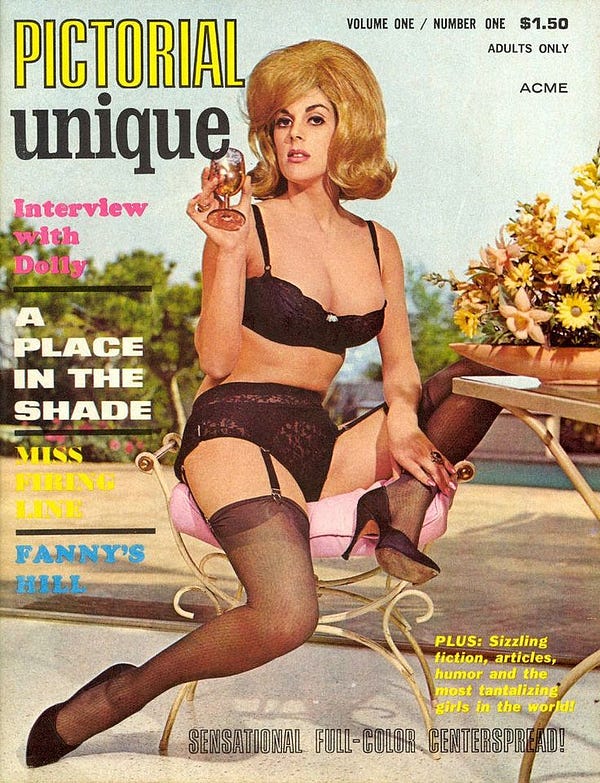
The pansexual office manager (a female who loved boobs) and the gay male branch president told me they wanted to gaze at me at the front desk. The office manager asked me to wear a garter belt. I did, once in a while.
Mostly I sat at my desk, in pantyhose, and read novels and wrote in a notebook. It was not a well-run office; it seemed I’d been lucky again. Somehow the “executives” had managed to sell their reputation to the company headquarters in Anaheim, but neither of the “executives” was particularly motivated to sell anything else and the phones weren’t ringing. So my job consisted mostly of an hour of filing in the morning and then seven hours of looking busy
.Well, there were one or two days of actual busyness. On one of those days, the office manager (who became my friend, especially after she told me about her “real” job, which was working as a sexual surrogate for men with Issues such as arrests for child molesting) wanted to go through all the files in the scant-shelved file room. I had a terrible sunburn from going to the beach that weekend, and each time I stood up to fetch another set of files, I thought I’d faint.
But that was the worst thing I had to do there. Maybe it played to some sadistic streak in my friend, maybe not. The pantyhose I was wearing over the sunburn made me crazy with itching.
The branch manager, a decaying beauty of forty-two with bright red (dyed) hair and lips drawn way outside her natural lipline, decided to take me in hand. It was easier than doing actual work, as she was too shy to make the cold calls that would bring in business. One morning she walked in with grocery bags full of shoes and purses and skirts.
My heart sank. I knew what this meant. I’d been wearing my most “normal” clothes, and there were no clients to see me anyway, but once again I was going to get schooled in the art of elaborate makeup and plain business attire and shoes that hurt my feet.
“Men complain about women’s periods but I’ve never known a menstrual period that could compete with a dude’s bowels for attention and interference in the workday.”
I wore the stuff she gave me. I had to. For the record, I think I hate mules even more than I hate pantyhose.
In time the team hired another “executive” and the home office fired the gay one for not producing. We were three women and one straight man with a mustache who left the office with a newspaper at ten every morning, cocking the paper my direction and saying, “I’ll be — right back.” The words somehow made a plop in the air. I was glad there was no bathroom in the actual office because I didn’t want to have to listen to him congratulating himself in it. Men complain about women’s periods but I’ve never known a menstrual period that could compete with a dude’s bowels for attention and interference in the workday.
There was once an occasion for taking photos — somebody’s birthday, maybe — and the mustache man sat in a chair while the rest of us stood around him. It wasn’t his birthday; I’m sure of that much. He wasn’t even the branch “president” by then; the redhead was. But somebody decided it looked better for all the girls to be standing around the guy, who grinned as we teetered in our heels.
I told myself I didn’t care. This wasn’t going to be my career. I didn’t even say anything when the mustache went off on a tear praising Oliver North as a national hero.
“Somebody decided it looked better for all the girls to be standing around the guy, who grinned as we teetered in our heels.”
That office didn’t have a bathroom but it did have a central “conversation area” surrounded by glass bricks. It was a nice place to eat the limp little sandwiches that were all my boyfriend and I could afford as we saved for the excursion to Turkey. He worked at night at the jail, evaluating prisoners to see if they could be released on their own recognizance, and he sometimes stopped by so we could see each other and share sandwiches. One day this almost got me fired, because when the “executives” returned from their lunch at Carl’s Jr., the boyfriend and I stood up to greet them over the glass brick wall.
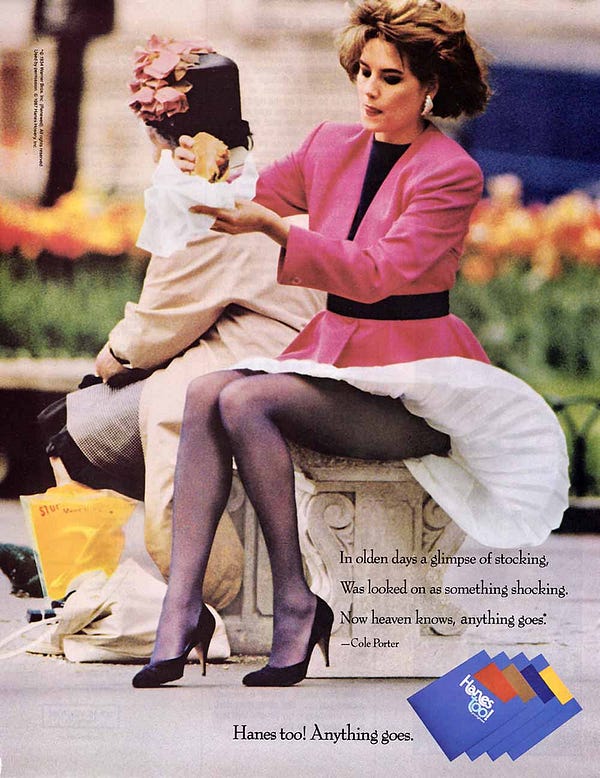
“If I was that girl’s boss, I’d fire her ass,” the mustache man said several times. I don’t know who he thought was my boss, but the office manager informed me that what I’d done was very bad.
I did not know why.
“Two little heads popping up over the wall and saying hello,” she said patiently.
I still didn’t get it.
“Suze, you can’t have sex in the office,” she said — which was reallyconfusing, not only because boyfriend and I had been fully clothed while eating our sandwiches on the sofa, but also because the stories I kept hearing from her involved everyone she’d ever worked with having sex with everyone else in an office, and then there was her other job too, the surrogate gig, and the fact that she’d told me she and her boyfriend fantasized about my boobs when they were shagging.
She still brings up that moment in the “conversation area” as if it’s something I did wrong.
But to me the message back then was that if I was going to be blamed for having sex in the office I should actually do it, so the next time the “executives” went to Carl’s Jr. for lunch … Yes, reader, the boyfriend and I did shag in the workplace. It was not on the sofa but in the kitchenette, on a laminate countertop. It was uncomfortable and it ripped a pair of pantyhose, but it proved a point, at least to us.
Later on, the redhead divorced her husband and married the mustache and also got a facelift.
I stayed friends with the office manager for years. She married someone she met through her “other job” — not a molester — and moved to a mountain.
My boyfriend and I went to Turkey, and in a cave in Cappadocia, a one-eyed man tried to pay money to have sex with me. My sweetheart was so upset about his failure to protect me that I had to comfort him and tell him everything was okay, when really of course it wasn’t.
Somehow that feels like a pantyhose moment too.
We broke up.
7. They help you; they hold you (back).
Somewhat adrift, I finished the Master’s degree at Berkeley but I wasn’t happy. I was still younger than anybody I knew in the program and I hated the competitiveness and general nasty attitudes my fellow-students had toward each other.
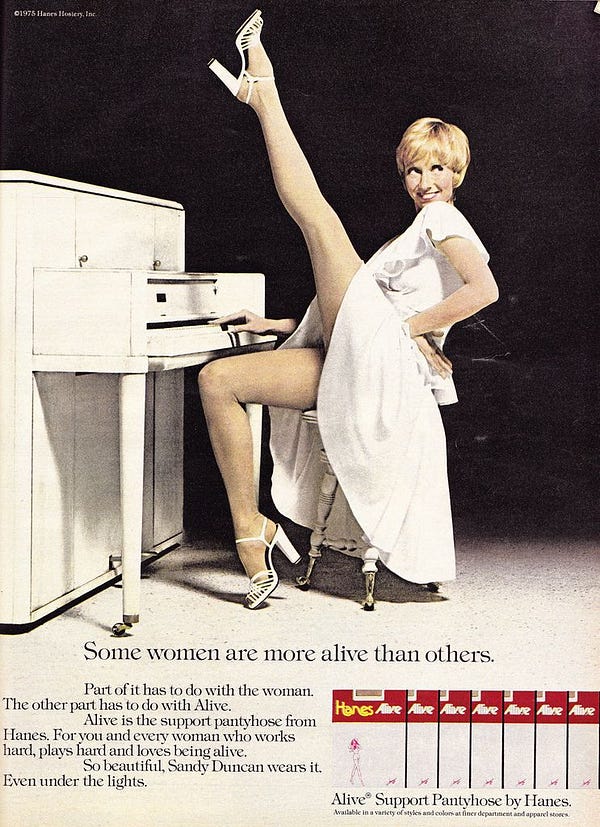
Naturally I decided that if I had to live with so much backbiting and politicking, I should do it in the corporate world, where it was all out in the open and nobody was pretending to be working for a greater good.
I applied for a pantyhose job.
The job was at a publishing house. I really, really wanted it. At the interview I said I believed that books could change the world.
With my spiffy c.v. and all my work experience and education, the one thing everyone commented on during the interview process was my typing speed. On the HR Selectric I’d typed 120 wpm.
I wore a brand-new business suit to the interview, though the job was being an assistant to two young editors and they probably wondered why I had it on. I never used the padded rayon jacket again, though I sometimes put on the skirt. I had a few vintage 1960s suits, but a friend advised me to avoid standing out. I bought more normal thrift-store clothing, and I took the black out of my hair, and I wore the goddamn pantyhose. Though sometimes they were plaid or yellow (I’d bought those in Berkeley).
This was Real Publishing, the kind called a “glamour profession,” punctuation always implied, mostly because the term meant people wanted the jobs but weren’t paid much to do them. Not much, but the most I’d made in my life till then: seventeen thousand a year. And five hundred on top. It was enough (barely) to pay rent on a studio apartment under the downtown flight path, to support me and a cat if I walked to work and never spent money on anything. But the beach was free, and I got to read books in the archives. Some of my favorite novels had come out of that publishing house in the 1950s and 60s.
“I was tangled up in pantyhose and trying to be a good girl, a good employee, and somewhat happy with what I was doing.”
The department where I worked was run almost entirely by women. In pantyhose. The only man working there was an editorial assistant who wore a Mickey Mouse watch and striped suspenders and said “at this time” a lot. He worked for the über-boss, who loved him — she raved about the watch and the suspenders and what a lot of “fun” he was. I liked him too; he was a very nice person; but I had to read and correct the grammar in what he wrote before he turned it in. I did that as a favor and sometimes he bought me a Greek salad.
I was also an editorial assistant, definitely unglamorous, and my job was to file and type and keep the books published on schedule. This was easier with one of my supervisors than the other. The easy boss treated me as a secretary, which was what I was, while letting me give input on the manuscripts in her care. The less easy boss was uncomfortable with our proximity in age and the fact that one of my best friends had known her in her rah-rah college days, and she didn’t delegate enough — she hated to tell me to file anything — so her filing piled up, and this reflected poorly on me.
The über-boss mostly worked at home or while flying around to see an aging musician for whom she was both fluffer and amanuensis. She was in the office a total of three days during my first three months, and one of those days coincided with the end of my probationary period. I was looking forward to being a fully fledged employee. After everyone had left that evening, she called me into her office and told me my probation would be extended because I wasn’t measuring up.
Actually, she handed me a memo that told me that. The memo said I needed to improve in all areas but that my ability to take direction made her willing to take a risk on keeping me in the pool.
“ The boss also told me that I needed to work on my confidence and on not letting myself seem weak in any way…. I wondered why she was implicitly telling me she was having trouble in her marriage.”
Despite the sofa scandal at the insurance brokerage, I had never been considered not-good at my job or unsatisfactory at anything I tried (admittedly, I had not tried hard to be a good waitress at Big Boy). The list of my sins was confusing: I needed to file things regularly, even if one editor didn’t want me to; I needed to stop showing off, though I didn’t know how I was doing it; I needed to use fewer big words and simplify my language on the phone because people thought I was acting snooty and waving around my M.A. from Berkeley. That last one was a shock because I never mentioned my degree and was ashamed of it because it wasn’t a Ph.D. I thought everyone knew that if you left a Ph.D. program with only an M.A., even if you had a 4.0 GPA, you were either secretly stupid or else a loser who couldn’t take the pressure.
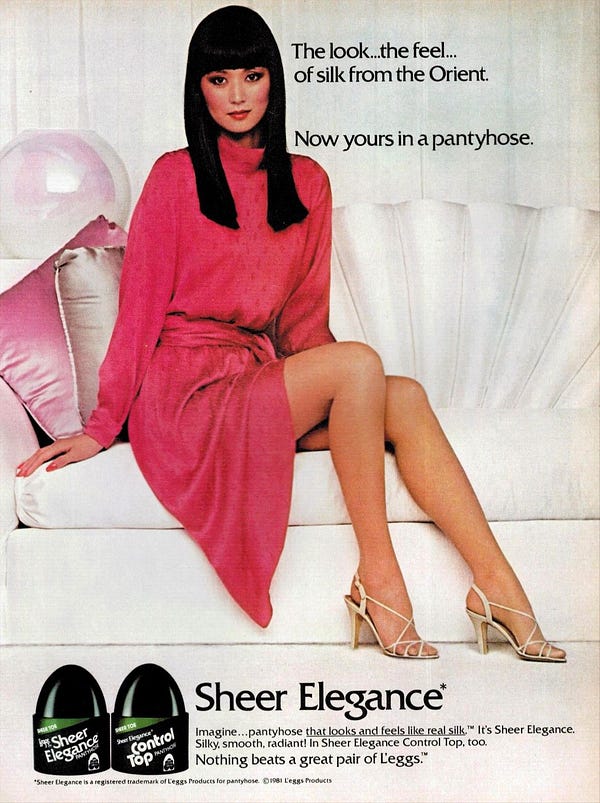
While I sat in stunned silence, trying not to cry, she gave me the lecture about buying business suits. We talked a little. The Mickey Mouse watch got a mention — “What fun!” — but while my co-worker’s watch was more than okay, my self-presentation was not.
The boss also told me that I needed to work on my confidence and on not letting myself seem weak in any way. She told me she’d once had to learn the same thing so that now, for example, she never let it appear as though she was having any trouble in her marriage.
I wondered why she was implicitly telling me she was having trouble in her marriage.
At the end of the conversation, I still had no idea how to improve my performance, other than the shopping spree I couldn’t afford. So what I did was this: I stopped trying so hard to do a good job. I’d been going in at seven a.m. and leaving at six, skipping lunch, taking work to the library at Thanksgiving. With my probationary period extended, I started showing up when the office opened and taking a lunch break and leaving shortly after office hours were officially over.
I suppose it was the equivalent of having sex at the office, but a miserable kind of sex.
I read at home for pleasure and cried a lot and dated a mistake of a person who kept telling me I needed to get rid of that pout below my navel, which is there even when I weigh 120 pounds on a 5’9” frame and will these Californian men pleasestop commenting on it? He bought me dinners and thought it was natural that I went to the bathroom and threw them up again afterward. He had a connection to the job and said I was probably in trouble because everyone in the department wanted to date him but when he saw me he’d announced, “Make that girl go out with me.” Which, he used to add when telling the story to his friends, the editors had done — they made me go out with him.
Actually, this wasn’t true; I would have gone to dinner with him anyway, because the very first time I got a short story published in a magazine, he had been the illustrator, and therefore I connected him with glamor of the gentlemen prefer sort.
The über boss once used company funds to pay for that man and me to spend the night in a hotel room after an art show. She took me shopping with her for a birthday present for him and told the sales clerk that she and I were sisters. I thought all this was odd behavior, but then again I’d also thought she approved of me up until the probation.
Yes, I recognize my mistakes … now. But back then I was tangled up in pantyhose and trying to be a good girl, a good employee, and somewhat happy with what I was doing. Trying. Anyway, the relationship — if it can be called that — ended fast.
“There was also an oppression of women by women, and it wore a smile and a pair of L’eggs and claimed to belong to a sisterhood.”
A few days after the breakup, I got taken off probation. The über told me she’d seen “a night and day difference” in my performance and gave me a hug.
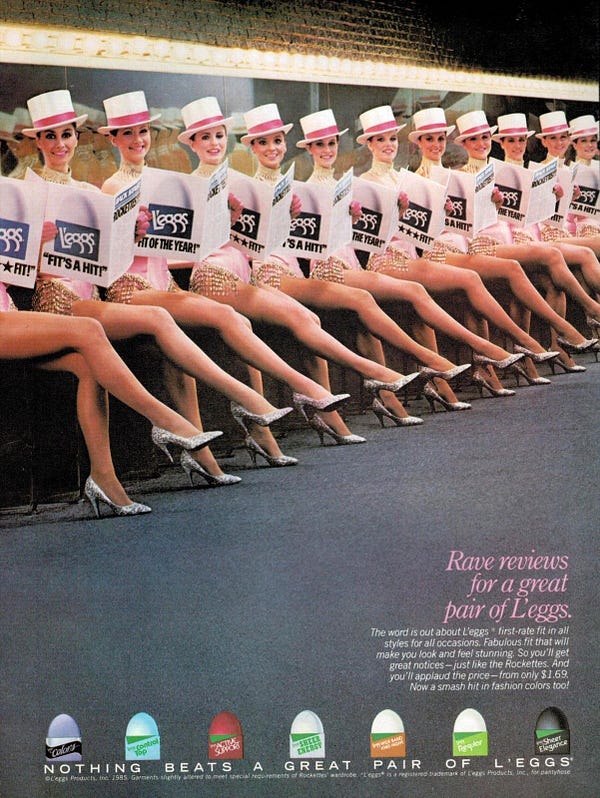
At that moment I officially hated her. I also hated myself and the system because it was such a mystery. I hated that the horrible man might have been right about sexual jealousy in a workplace I’d idealized for being a hive of feminine cooperation. (For the record, I don’t think now that he actually was right, but I do know that was a miserable place to work.) I hated that this person who had been so critical of me and so stern saw herself as a beacon of hugging light. I hated that to be a woman in that environment, I had to let myself be hugged and pretend to like it. I hated the pantyhose sagging at my crotch and the way my legs felt hot and self-conscious during the hug.
Maybe my former employer, the fantasy-quote man, had had a point about the oppression suffered by white men. But there was also an oppression of women by women, and it wore a smile and a pair of L’eggs and claimed to belong to a sisterhood.
To this day, I don’t believe my job performance had improved at all; in my depression, it had devolved, and I know my vocabulary suffered as I deliberately simplified it. I feel I’ll never be as smart as I was before I had that job. But I suppose my ultimate reward was twofold — I got to work less hard and I also got accepted, at a level of mediocrity that made me more palatable to someone wearing pantyhose much spendier than mine.
The one thing I knew, really, was that I had to dress for a certain role. So I did. And I kept hating the clothes, the job, myself.
One night I almost died and when I went home after the hospital (and before the struggle over how to pay the bill with no insurance), I asked myself what I really wanted to do with my life. It did not involve pantyhose. I went back to grad school — on the other side of the continent, in a different discipline — and I racked up two Ph.D.’s while freelancing as a copyeditor and occasional book doctor for an editor (not in the circle mentioned above) who saw something in me and my work on all those stacks of manuscript, and who is now my editor, the publisher of my third and most successful novel.
I’m pretty sure she doesn’t own a single pair of pantyhose or even stockings. She’s British.
8. Problems seem to disappear … ?
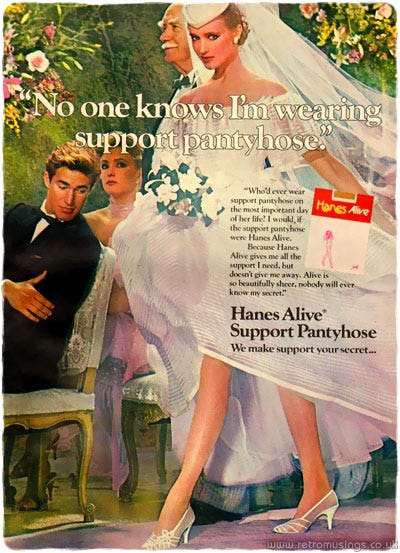
I’m trying to calculate, now, how many pairs of pantyhose I’ve owned in my life and how many I’ve discarded. I’m an at-home novelist and on-campus professor. I live in Virginia, where in summer I go bare and in winter I wear fishnet tights, which are durable and let the air circulate comfortably around one’s legs but probably look like a misguided attempt at sexiness as I leave behind my fifth decade of living.
For years I haven’t needed pantyhose at all, but as I noted parenthetically many pages ago, they are the governing metaphor of my early work life. I’m always uneasily aware of them. And I’m not alone in that; when a friend was invited to give a speech at graduation, she knew she should wear a skirt, but she had to ask around about whether pantyhose would be a required part of the outfit. She decided to err on the safe side and bought herself a pair of Calvin Kleins.
I’ll leave other kinds of stockings out of the tally — but believe it or not, I’ve discovered that old-fashioned corsets often give an injured back some good support, and sometimes it’s easiest to attach Dita Von Teese–type stockings and live with the little points of pain that have faded in comparison to chronic migraines. And there’s always the possibility that one’s veins will pop or diabetes will necessitate some kind of “compression hosiery” bought at medical warehouses.
As to pantyhose, I still have maybe a dozen pairs in a box somewhere, for emergency formal occasions and job interviews — but women aren’t really wearing pantyhose to job interviews in academia anymore. They wear tights or pantsuits.
“For years I haven’t needed pantyhose at all, but as I noted parenthetically many pages ago, they are the governing metaphor of my early work life.”
I still prefer skirts, and my wardrobe is at least fifty-percent vintage. I wore my college clothes well past tenure and into my forties, when my then-boyfriend (now my husband) took a look in my closet and said, “You might think of buying some stuff without holes or faded patches.”
It made sense. I am now a professional woman, a term that has changed a lot since my twenties. I went on eBay and bought some high-quality thrift. I also gained some weight when I finally kicked bulimia, so I’m shopping again. But not for pantyhose.
Here’s a rough figure: Say two or three pairs a week for the months and years I had pantyhose-typewriter jobs, and a few more pairs for interviews at jobs I either didn’t get or didn’t need pantyhose for … and remembering that even Bob’s Big Boy required run-free pantyhose of its waitresses … I’m guessing the number to be around 370.
Three hundred and seventy.
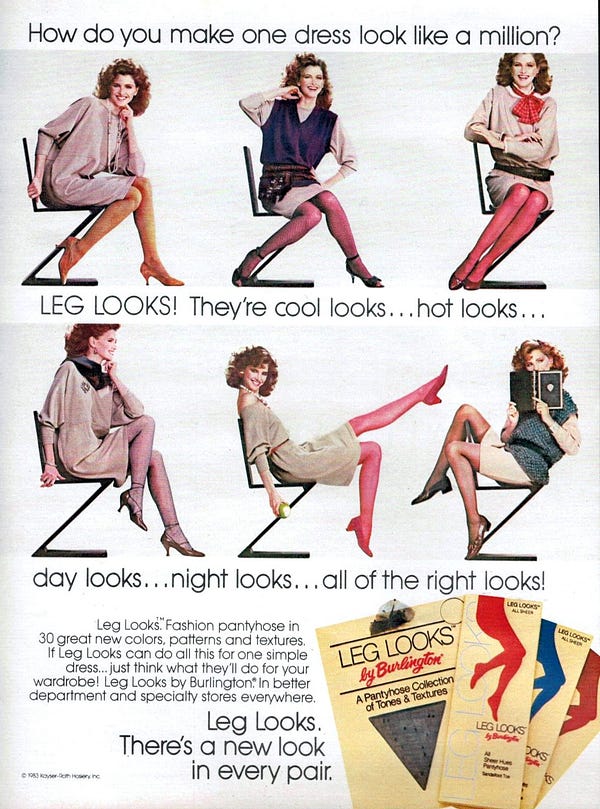
That figure seems both high and low. I’ve spent years not wearing those maddening, snaggy, runny, expensive abominations to the female form and psyche, but mentally the pantyhose are always with me, even though I’ve been able to use my typing (145 wpm at last testing) for more than other persons’ reports and forms and letters and papers.
I can’t say I’ve enjoyed any job very much for long. I’m not much of an Organization person and I still have a tendency to drop a “Fuck you” if I feel pushed too hard, too inappropriately. If I were to go into administration, I’d have to curb my tongue and pull out the hose again; it’s part of the culture. As is Spanx, and other “shapewear” that has become famously if wry-smirkily expected of women in the public sphere. Because of health issues and an innate drive toward solitude, I work at home as much as I can, and it’s best not to describe what I wear then.
“Wherever I am, I’m always aware of pantyhose.”
Pantyhose, surprisingly, have developed a flourishing fetish category of their own, often involving hose pulled over the head of an outwardly alpha man being tortured, and/or worn on the legs and pulled up so high they smash his wobbly bits. A dominatrix splits them open and he loves it. This kind of thing doesn’t have its own category on PornHub.com yet, but I’m keeping my eyes peeled. White men oppressed by their success and ability to earn are said to eat this stuff up.
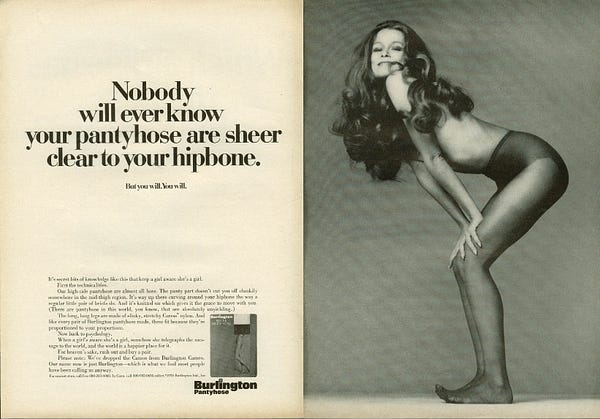
But back to me: Wherever I am, I’m always aware of pantyhose, and if I didn’t have at least those few pairs in a drawer I’d be anxious. You never know when you’re going to need them, that’s the thing. However women have managed to free themselves from the L’eggs that fit their legs, the hateful things are still sold (albeit on much smaller racks) in grocery stores in case we need to pick up a quick pair on the way to or from a special ball, or work, and now they cost seven or eight dollars. Designer brands can list at seventy or eighty a pair. Really, why?
Here’s the big rub: However we may twist our talents, whether we want to be secretaries (a profession for which I have great respect after all) or not, even if we’ve managed to rid ourselves of the stereotype of the perky office Girl Friday in her makeup and heels and hose, and although some workplaces actually do make an effort to eradicate the kind of sleazy male mustache-twitching that was de rigueur during my pantyhose years in the 1980s and endures even now, one catchy fact holds true somewhere deep in our psyches, and it’s almost what Ernest Hemingway said happens if you’ve been young and in Paris (and at a typewriter) …
If you’ve been young and in pantyhose, here’s the truth: Whether they help you or hold you —
THEY NEVER LET YOU GO.
****************************************************************************************************
As visual and aural aids, enjoy Susann’s favorite playlist of pantyhose commercials (WARNING: MAJOR EARWORMS):
https://www.youtube.com/watch… (the ultimate in lecherous pantyhose appreciation)
https://www.youtube.com/watch?v=x4PYqZ7cGDg (secret agent pantyhose!)
https://www.youtube.com/watch?v=C7We7hLFuDQ (pantyhose at the zoo!),
https://www.youtube.com/watch?v=gTh3nQpSPG8. (Joyce DeWitt!)
http://writersonthejob.webdelsol.com/#
****************************************************************************************************
 Thomas E. Kennedy and Walter Cummins invited Cokal to be part of “Writers on the Job,” which is a regular web feature and also, now, a book, From Pantyhose to Spandex: Writers on the Job Redux.
Thomas E. Kennedy and Walter Cummins invited Cokal to be part of “Writers on the Job,” which is a regular web feature and also, now, a book, From Pantyhose to Spandex: Writers on the Job Redux.Both website and book feature harrowing tales of degradation and existential ennui, and they’re highly recommended … As is the new word “wotj,” which Urban Dictionary defines as “a job you don’t want to do but must in order to pay the bills.”
— — — — — — —
In addition to serving as Broad Street’s editorial director, Cokal is a novelist, scholar, and critic. Her novels are Mirabilis, Breath and Bones, and The Kingdom of Little Wounds; her shorter work has been featured in The New York Times Book Review, The Cincinnati Review, Electric Literature, The Journal, Quarterly West, Writers Ask, The Saint James Encylopedia of Popular Culture, and many other venues.

True stories, honestly.








